- Home
- J. M. Redmann
The Girl on the Edge of Summer Page 15
The Girl on the Edge of Summer Read online
Page 15
“The one from the school. You met us at the pizza place.”
I considered claiming to have met a number of Brandons at a number of pizza places, in an attempt to teach him the value of giving more complete information than he was giving, but the Scotch had mellowed me. I chose not to be a jerk. “Oh, yes, of course. Thanks for calling. What info do you have?”
“Can we meet to talk about it?”
No, absolutely not. That case is over. “I don’t want to waste your time.” Or mine. “Can you give me some idea of what this is over the phone?”
“It’s better not. Can be tapped. We should meet.”
I did not sigh. I just wanted to. “Okay, let me look at my schedule.”
I looked at my schedule, just in case I’d booked a three-week trip to Spain and couldn’t meet until after that. Alas, it looked like all I had was a haircut. An hour tops. Indeed, my schedule looked more bare than not.
He suggested tomorrow. I put him off to the next day because my pride didn’t want to admit I had so little going on. Same after-school time, same after-school pizza place.
Another Scotch, and the day passed.
CHAPTER TWENTY
For reasons known only to my body, I woke shortly after the sun started shining. Maybe because it was a pretty day, humidity on the lower side, clear perfectly cerulean blue sky. I sipped my coffee on the back patio, contemplating what I’d do with this perfect day.
Sitting in my office and tending to paperwork wasn’t calling my name.
I could work on the one official case I had. Or call it work and see if either the library or courthouse where Mr. Frederick Townson lived had any records. A long shot—oh, so long as to be hitting a needle in a haystack at one hundred yards—but it was an excuse to take a drive on a pretty day, and that was all I needed.
His former property looked like it was near the boundary between Iberville Parish and Ascension Parish. Iberville looked easier to get to, with both the courthouse and main library in Plaquemine. I’d manage enough searching to claim I’d done due diligence, have a good lunch at some local place, and drive back before dark. A perfect day, one I could claim was actual work.
Even with my earlier than usual hour, traffic was annoyingly busy. However, most people were coming into the city and I was going out. Once I passed the airport and took 310 to the Westbank, the cars thinned. I took the river road. It wasn’t the fastest, but that wasn’t the point of today. I drove through small towns, many of them looking like time—and wealth, even comfort—had passed them by.
It took me about two hours to reach my destination. It was a pretty town, old tin-roofed houses, lots of green space. Even the ubiquitous bail bond place next to the courthouse looked respectable. The kind of place people like me left as soon as we could. This was not liberal country and not the kind of place that welcomed gays or lesbians. Parking was easy; although a big lot was reserved for employees only, another even bigger lot was close by.
I found my way to the records office.
First I did a property search. Mr. Frederick Townson had inherited his land from his father, Charleston Townson IV. I didn’t bother to check back, presumably Chuck had gotten it from I through III. I was right on my map reading, most of it was in Iberville Parish with a toehold in Ascension. The property was sold in 1907 to Herbert Gallier. No more Townsons. Presumably by his widow. Then I switched to birth and death records. He was born in 1867, which meant he was thirty-nine when he died. There had been a Charles V, but a check of death records revealed he had died at age ten of yellow fever. Further searching revealed that Frederick was the third son, another had been killed at age twelve in a riding accident. No vaccinations, no public health, no doctor close by. Life is ever fragile, was even more so back then. Frederick seemed to be the only son, of four total, who made it to adulthood. He also had three sisters. They seemed to be of hardier stock, as I could find no death certificates for them, only the record of their birth. Presumably they had married and moved away.
Interesting as this was, it really had no bearing on the case. It was late enough in the morning for me to call it lunchtime. I thanked the helpful clerk and exited to find food. I left my car in the parking lot and found a po-boy place a few blocks away (admittedly using my phone).
With an oyster po-boy sticking to my ribs, I retrieved my car and headed to the library.
Proving my point that it’s hard to tell lesbians from librarians. My bias might be showing. It could be hard to tell smart, practical women from lesbians. So much overlap. The woman in front of me was fifty-ish, short salt-and-pepper hair, pants, and practical shoes. Oh, and a wedding ring. Maybe to another woman, but not likely to display it in this part of the world. I asked for copies of the local papers from around 1900 to 1907. She was very helpful and got me set up with what they had. There was an ongoing digitalization project, so some of it was searchable, from 1900 to 1905. I looked for the name of Townson.
Oh, yes, they were an important local family. I found marriage announcements of both his oldest niece and his youngest sister—the niece was sixteen, the sister a spinsterish twenty-two. Awards and events, blah, blah, blah.
A trip by Mr. Townson on a new riverboat up to St. Louis. I noted the date, the last week of September in 1903. Another trip noted for one of the first gatherings of sugar cane industry in Natchez, via train. Again I noted the date.
A lot of information on crops and how much was bought and sold. Yawn. In my lunch walk, I had noted there was no handy coffee shop to grab a cup to go.
I was falling asleep.
One final task. Check the papers around the time he was murdered. See what they said.
Spring of 1906? I was blanking on the date. May? March? This wasn’t the Sunday New York Times; I could skim through a couple of months.
Mr. Frederick Townson took another trip in the middle of March that year, this time to Memphis to investigate the purchase of a motor car. Yep, that’s what the newspaper said. When he came back in the end of March, they interviewed him about the new cars. He said he was still considering but felt it could never replace the horse, that wheels required easy surfaces, unlike hooves.
His wife had another baby, a girl. That was a smaller story than the one about his car adventure. A much smaller story.
Then at the end of May, front page, large headline: Prominent Planter Murdered in New Orleans. Then followed a sanitized version of his death. He was “put upon by vagabonds” and “fought back valiantly as any man with family who love and depend on him,” but “in the end, it was for naught, the brutes overcame him in their lust for his purse and fine watch.” No mention of where the murder took place other than the general New Orleans. It then went on to list his many awards and accomplishments, named his three sons, also mentioned two daughters and a distraught wife, whose only name was Mrs. Frederick Townson. And ended with “police are diligently searching for the foul fiends who would destroy such a family.”
I rubbed my eyes and considered leaving it at that. But I was here, would likely never be here again, and I might as well read another month.
The story of his murder stayed on the front page for a few weeks, but as nothing came of the investigation, it gradually got supplanted by more important things like the price of cotton and sugar cane.
His body was brought back and the funeral held a week after the murder. Another front-page headline, with a list of who’s who at the funeral. The last sentence of the last paragraph said, “Two of his sisters were unable to attend due to other pressing duties.”
Interesting. I did a quick search on the digital pages. One sister married and moved to Lafayette, according to her marriage announcement. Certainly close enough to return for a funeral. I couldn’t find the notice for the other sister and wasn’t willing to go back to the courthouse to look for marriage licenses. But still odd that two of his three sisters did not attend his funeral. Maybe they were both pregnant, and that was called “other pressing duties.”
&n
bsp; I read a little further and was rewarded with a note about the missing sister coming to help her sister-in-law, still only named as the Mrs., with running of the plantation. She, it turned out, lived in Baton Rouge. Still no way to know why she skipped his funeral, but it hinted at the kind of man he was. His sisters were willing to overstep the polite conventions of the time to not pay him any last respects.
I looked at my watch. It would be closing time here shortly. I made a few copies of the more pertinent articles, ones Mr. Douglas might like, such as the big funeral headline. And a few for myself just in case I wanted to refer to them again.
I noted down where the plantation had been and found it on the current map. So many years had passed, nothing could remain that would tell me anything about Frederick Townson, but still I drove the back roads out to as close as I could get, stopping at the side to gaze at it in the setting sun. Desolate, fields that were no longer tilled, taken over by the slow creep of nature. Off in the distance a house, but even from here I could see it was derelict, crumbling, also being reclaimed by nature. After his death and his widow’s remarriage, it had been sold, but, fanciful in the gloom, I wondered if his taint remained, an evil, vile man, and he left enough of it behind to haunt his land, driving owners away as if they knew they walked where a murderer had walked. A cloud covered the setting sun and a chill ran down my back. I started my car and drove away, one eye in the rearview mirror for ghosts.
I took the faster way back, not wanting to linger on the back roads after dark, catching the Sunshine Bridge and then up to I-10 just as the sun disappeared from the sky.
As I drove the all-too-familiar road—lot of records in Baton Rouge, and this is the way there—I debated how many of these hours I dared to charge to Douglas Townson. He’d only hired me for the quixotic task of trying to solve a hundred-year-old murder, not to dig up his great-grandfather’s sordid life. See what the retainer covered, I decided, and then I’d deal with any extra hours, whether to charge them to him or just call it that I was damned if his ugly secrets would stay buried.
CHAPTER TWENTY-ONE
My body was not so eager this morning, blissfully sleeping in as the sun climbed in the sky. It was close to 8:30 when I woke, having forgotten to set the alarm clock. I managed a quick shower, considered a bagel, then realized I didn’t have any. Maybe there was a granola bar at the office.
I headed there automatically. I could sit at my desk, pretend to work and sort out my day.
No granola bars. My stomach rumbled. I vowed that I would run by the grocery store after meeting…what was his name? The schoolkid? Braydon? Bartok? What music was I listening to last night? Beethoven? Brahms? Ah. Brandon.
That left me with the debate of whether or not to break my rule and get something at the downstairs coffee shop or to hoof it to somewhere a few blocks away.
The phone rang.
Joanne. “We need you to show where you fired the bullets into the lawn.”
“You what?” Not enough coffee yet.
She repeated it slowly. “Your bullet in the lawn.”
“Umm, yeah. About fifteen-twenty feet to the right—facing the house—from the walkway.”
“Why don’t you come show us?”
Not what I wanted to do. Needless to say, I didn’t mention that. “Now?”
“Meet us there in an hour.”
The silver lining was it gave me an excuse to go downstairs and get a maple syrup pecan croissant—the plainest one they had. I scarfed that while chugging the coffee. Decided that if need be I could hit up Mrs. S for the bathroom and made another travel mug to go. It was not possible to have too much caffeine this morning.
Fifty-five minutes later, I was again parked outside Mrs. Stevens’ tidy suburban house. A few blades of grass were starting to grow slightly taller than their compatriots. Revolt in the lawn.
Of course I only noticed this because no one else was here and I had nothing better to do than scrutinize the blades of grass between checking my phone every few seconds for a message that said “never mind.” I twice checked my calendar to make sure it wasn’t April first.
When the police tell you to meet them somewhere, you can’t ditch it when they’re a few minutes late. Not even half an hour late, as it was now.
Presumably they’re saving damsels in distress. Or dudes in distress.
Another five minutes ticked by.
Suddenly two cars pulled up behind mine, one marked as the Jefferson Parish Sherriff Office—JPSO, and the other not, but clearly a cop car, and the street was no longer a quiet bastion of suburban bliss.
I got out to greet them. My “hi” was answered with a nod from Joanne and a grunt from the deputy. The others were taking some gear out of the unmarked car. I was guessing that both NOPD and the Jefferson Parish folks were now involved since this case seemed to straddle the two jurisdictions.
“Show us where you think it hit.”
It felt like such a blur—I didn’t say that. The quickness of violence, little chance to think, only to react and hope I’d made the right decision. “I was about here,” I said as I came up the walk. “And fired…around here.” I lifted my hand as if I had a gun in it, trying to recapture the angle. I had deliberately aimed yards away to lessen the possibility of anything the bullet hit coming back at me. I’d call it us, if they asked, but really me. But I also made sure the bullet would hit the ground and not skitter someplace it shouldn’t.
“Hold that,” one of the crime scene techs said to me. Without asking he wound a string around my wrist, then walked it out at the angle I indicated until it touched the ground. A nice pristine patch of grass.
From there he started walking slowly, still using the string as a guide, carefully examining the lawn first on one side of the initial point and then the other.
My arm was starting to get tired.
He walked another few feet.
I wasn’t really sure this was the exact place and angle I had been when I fired the gun; it was just my best guess. I tried to recall the scene. I had been looking at Fast Eddie, looking for any hint he would strike and I’d have to do more than fire my gun safely into the dirt. Only because I heard what sounded like a bullet hitting ground—and that had been what I was intending to do—did I assume it had hit somewhere in the lawn.
My arm was starting to tremble.
Maybe it had gone farther than I thought, through the hedge and into the next yard. Maybe I’d hit a bird and it had flown away injured. Or killed and carried away by a cat. No, I was pretty sure I hadn’t hit anything. The truth was I mostly fired my gun at the range with heavy-duty earmuffs on, and I had no idea what a bullet hitting dirt or a hedge would sound like.
My arm dropped. I couldn’t hold it up anymore. The tech looked back at me, disappointed. I shrugged and rubbed my shoulder.
“I’m sorry,” I said, not really sorry. “I was worried about getting punched. I may have hit closer to the hedge.”
“Grid search,” Joanne called. She, both techs, and the JPSO deputy lined up along the walkway and then slowly moved across the yard.
I took the string off my wrist.
They were almost to the hedge at the property line when one of the techs said, “This might be it.”
It was only about twenty feet off from where I had pointed.
How long can it take to dig a bullet out? Well, first they had to measure everything, then take pictures of the measurement, switching cameras from NOPD and JPSO. Slowly, I might add. If this kept up much longer, I was going to need a place to deposit the pass-through coffee. There were no lights on or movement in the house—and you’d think two cop cars parked outside your house would have generated movement—meaning Mrs. Stevens didn’t seem to be home and was therefore unlikely to let me use her bathroom, which I’m sure she called a powder room.
I was checking my phone (only thirty-seven times so far) for the important message I knew had to be about to arrive to demand my presence elsewhere, when Joanne came
over to me.
“We’re having trouble finding the bullet,” she said in her carefully controlled neutral voice that told me she wasn’t just chatting me up because she was as bored as I was.
“Maybe it went to China. Or hit a stone in the ground and ricocheted elsewhere.”
“These guys are usually pretty good at finding bullets,” she responded.
“Look, I fired the gun. Once. There is a bullet there somewhere, but maybe not somewhere to be found.”
“You didn’t like Edward Springhorn, did you?”
“No, why would I? He was a scumbag who sexually coerced young girls, making their lives a misery.”
“You think Tiffany wasn’t his only conquest?”
“He was too practiced at it. You know that.”
“The kind of guy the world would be better off without. As long as he’s around, there’ll be another victim.”
“A lot of girls got lucky when he kicked the bucket.”
“So you could say someone did a favor when they killed him?”
I didn’t like where this conversation was going. “Inadvertent. My money is on one of his pond slime friends getting into a fight over drugs, or booze. No one was doing anyone any favors here.”
“You’ve been under a lot of stress lately.”
“We all have. No more for me than anyone else.”
“Break up of a long-term relationship, fall into a messy rebound, carrying two mortgages with a downturn in business. That’d be a lot of stress for anyone.”
“I’m doing okay,” I said tersely. And didn’t add this is none of your fucking business.
“Are you?”
She left a silence. I finally blundered in and filled it. “Yes, I’m fine. I didn’t kill Fast Eddie, if that’s what you’re angling at.”
“I wouldn’t blame you if you had. He threatened you. He was clearly a violent man. It could have been self-defense.”

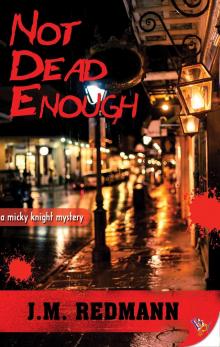 Not Dead Enough
Not Dead Enough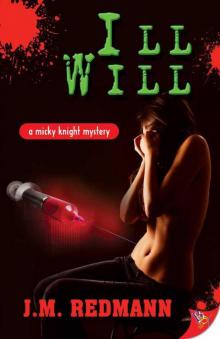 Ill Will
Ill Will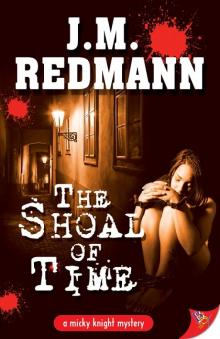 The Shoal of Time
The Shoal of Time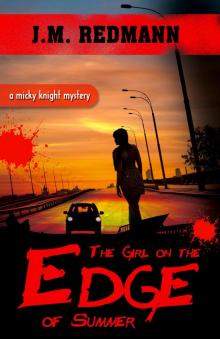 The Girl on the Edge of Summer
The Girl on the Edge of Summer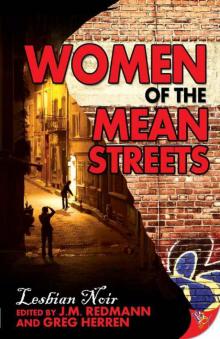 Women of the Mean Streets
Women of the Mean Streets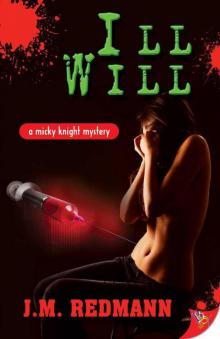 J.M. Redmann - Micky Knight Mystery 7 - I'll Will
J.M. Redmann - Micky Knight Mystery 7 - I'll Will